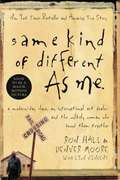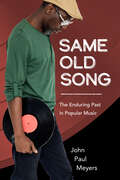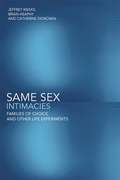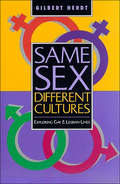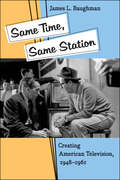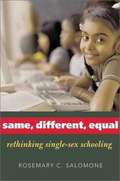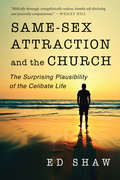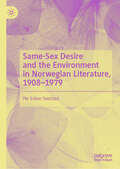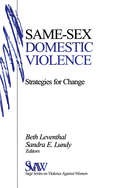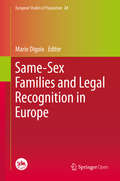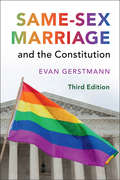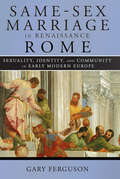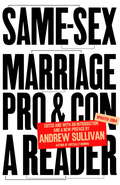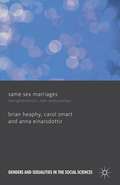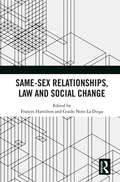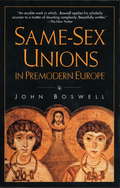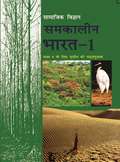- Table View
- List View
Same Kind of Different As Me
by Ronald E. Hall Denver Moore Lynn VincentA dangerous, homeless drifter who grew up picking cotton in virtual slavery. An upscale art dealer accustomed to the world of Armani and Chanel. A gutsy woman with a stubborn dream. A story so incredible no novelist would dare dream it. It begins outside a burning plantation hut in Louisiana . . . and an East Texas honky-tonk . . . and, without a doubt, in the heart of God. It unfolds in a Hollywood hacienda . . . an upscale New York gallery . . . a downtown dumpster . . . a Texas ranch. Gritty with pain and betrayal and brutality, this true story also shines with an unexpected, life-changing love.
Same Old Song: The Enduring Past in Popular Music (American Made Music Series)
by John Paul MeyersPopular music and its listeners are strongly associated with newness and youth. Young people can stay up late dancing to the latest hits and use cutting-edge technology for listening to and sharing fresh music. Many young people incorporate their devotion to new artists and styles into their own developing personalities. However, if popular music is a genre meant for the youthful, what are listeners to make of the widespread sampling of music from decades-old R&B tracks, sold-out anniversary tours by aging musicians, retrospective box sets of vintage recordings, museum exhibits, and performances by current pop stars invoking music and images of the past? In Same Old Song: The Enduring Past in Popular Music, John Paul Meyers argues that these phenomena are part of what he calls “historical consciousness in popular music.” These deep relationships with the past are an important but underexamined aspect of how musicians and listeners engage with this key cultural form. In chapters ranging across the landscape of twentieth- and twenty-first-century music, Meyers finds indications of historical consciousness at work in multiple genres. Rock music canonizes its history in tribute performances and museums. Jazz and pop musicians cover tunes from the “Great American Songbook.” Hip-hop and contemporary R&B singers invoke Black popular music from the 1960s and 1970s. Examining the work of influential artists like Ella Fitzgerald, Bob Dylan, Miles Davis, Kanye West, Prince, D’Angelo, and Janelle Monáe, Meyers argues that contemporary artists’ homage to the past is key for understanding how music-lovers make meaning of popular music in the present.
Same River, Twice: Putin's War on Women
by Sofi Oksanen“In Same River, Twice, one of Europe's leading novelists uses her personal experience to shed light on the personal experiences of others: ordinary women trapped in the crossfire of a great geopolitical game.” —Benjamin Moser, Pulitzer Prize-winning author of Sontag: Her Life and Work“It’s one of those books that can truly change a reader's life. . . . A powerful, unforgettable read.” —Andrey Kurkov, award-winning author of Grey Bees and The Silver BoneBlending the journalistic rigor of Masha Gessen with the call to action of We Should All Be Feminists, a searing denunciation of Putin’s Russia, revealing how modern Russia’s history of weaponizing sexual violence against women plays a crucial role in its current strategy to retain political influence and dominance abroadOn March 22, 2023, the Swedish Academy organized a conference on threats to democracy and freedom of expression featuring a slate of distinguished speakers including Arundhati Roy, Timothy Snyder, and Sofi Oksanen. Oksanen’s address—entitled “Putin's War on Women”— would go on to spark such interest that the acclaimed Finnish writer felt compelled to return to it as the basis for a larger, more in-depth look at Putin’s threat to women. The result is Same River, Twice, a devastating book-length essay that incisively builds on the themes and arguments first presented in her powerful speech.During the Soviet occupation of Estonia, Oksanen's great-aunt was arrested and brutally interrogated overnight. Left permanently traumatized by the experience, she would never speak again. Using her family story as a starting point, Oksanen launches an investigation into the systematic crimes that the Russian government has, for nearly a century, committed with impunity. From the Russian military's entry into Berlin in 1945 to its modern invasion of Ukraine, Russia has continually employed violence against women when combatting its enemies. Life for women in Putin's Russia is little better; gender equality is in decline, women are silenced by the legal system, and rape is used to humiliate victims, especially women in media.Through Oksanen's sober analysis a disturbing picture emerges: under Putin, misogyny has become foundational to the state’s power. It underpins the current regime, serves as a means of weaving international alliances, and forms an essential part of Russia’s ongoing genocide in Ukraine, in turn posing a threat to the rights of women and minorities worldwide. As threats to democracy grow stronger across the globe, the powerful and timely Same River, Twice is a warning that cannot not be ignored.Translated from the Finnish by Owen F. Witesman
Same Sex Intimacies: Families of Choice and Other Life Experiments
by Jeffrey Weeks Catherine Donovan Brian HeaphyOur families are increasingly a matter of choice, and the choices are widening all the time. This is particularly true of the non-heterosexual world, where the last ten years have seen a popular acceptance of same sex partnerships and, to a lesser extent, of same sex parenting. Based on extensive interviews with people in a variety of non-traditional relationships, this fascinating new book argues that these developments in the non-heterosexual world are closely linked to wider changes in the meaning of family in society at large, and that each can cast light on the other. Same Sex Intimacies gives vivid accounts of the different ways non-heterosexual people have been able to create meaningful intimate relationships for themselves, and highlights the role of individual agency and collective endeavour in forging these roles: as friends, partners, parents and as members of communities. This topical book will provide compelling reading for students of the family, sexuality and lesbian and gay studies.
Same Sex, Different Cultures
by Gilbert HerdtBecause homoerotic relations can be found in so many cultures, Gilbert Herdt argues that we should think of these relations as part of the human condition. This new cross-cultural study of gays, lesbians, and bisexuals around the world, Same Sex, Different Cultures provides a unique perspective on maturing and living within societies, both historical and contemporary, that not only acknowledge but also incorporate same-gender desires and relations. Examining what it means to organize "sex” in a society that lacks a category for "sex,” or to love someone of the same gender when society does not have a "homosexual” or "gay/lesbian” role, Herdt provides provocative new insights in our understanding of gay and lesbians lives. Accurate in both its scientific conceptions and wealth of cultural and historical material, examples range from the ancient Greeks and feudal China and Japan to the developing countries of Africa, India, Mexico, Brazil, and Thailand, from a New Guinea society to contemporary U. S. culture, including Native Americans. For all of these peoples, homoerotic relations emerge as part of culture--and not separate from history or society. In many of these groups, loving or engaging in sexual relations is found to be the very basis of the local cultural theory of "human nature” and the mythological basis for the cosmos and the creation of society. The mistake of modern Western culture, Gilbert contends, is to continue the legalization of prejudice against lesbians and gays. In this light, the book addresses the issue of "universal” versus particular practices and reveals positive role models that embrace all aspects of human sexuality. Finally, it offers knowledge of the existence of persons who have loved and have been intimate sexually and romantically with the same gender in other lands through divergent cultural practices and social roles. The most important lesson to learn from this cross-cultural and historical study of homosexuality is that there is room for many at the table of humankind.
Same Sex, Different Cultures: Exploring Gay And Lesbian Lives
by Gilbert H HerdtBecause homoerotic relations can be found in so many cultures, Gilbert Herdt argues that we should think of these relations as part of the human condition. This new cross-cultural study of gays, lesbians, and bisexuals around the world, Same Sex, Different Cultures provides a unique perspective on maturing and living within societies, both historical and contemporary, that not only acknowledge but also incorporate same-gender desires and relations.Examining what it means to organize "sex" in a society that lacks a category for "sex," or to love someone of the same gender when society does not have a "homosexual" or "gay/lesbian" role, Herdt provides provocative new insights in our understanding of gay and lesbians lives. Accurate in both its scientific conceptions and wealth of cultural and historical material, examples range from the ancient Greeks and feudal China and Japan to the developing countries of Africa, India, Mexico, Brazil, and Thailand, from a New Guinea society to contemporary U.S. culture, including Native Americans. For all of these peoples, homoerotic relations emerge as part of culture-and not separate from history or society.In many of these groups, loving or engaging in sexual relations is found to be the very basis of the local cultural theory of "human nature" and the mythological basis for the cosmos and the creation of society. The mistake of modern Western culture, Gilbert contends, is to continue the legalization of prejudice against lesbians and gays.In this light, the book addresses the issue of "universal" versus particular practices and reveals positive role models that embrace all aspects of human sexuality. Finally, it offers knowledge of the existence of persons who have loved and have been intimate sexually and romantically with the same gender in other lands through divergent cultural practices and social roles.The most important lesson to learn from this cross-cultural and historical study of homosexuality is that there is room for many at the table of humankind.
Same Sex, Different Cultures: Exploring Gay And Lesbian Lives
by Gilbert H HerdtBecause homoerotic relations can be found in so many cultures, Gilbert Herdt argues that we should think of these relations as part of the human condition. This new cross-cultural study of gays, lesbians, and bisexuals around the world, Same Sex, Different Cultures provides a unique perspective on maturing and living within societies, both historical and contemporary, that not only acknowledge but also incorporate same-gender desires and relations.Examining what it means to organize ?sex? in a society that lacks a category for ?sex,? or to love someone of the same gender when society does not have a ?homosexual? or ?gay/lesbian? role, Herdt provides provocative new insights in our understanding of gay and lesbians lives. Accurate in both its scientific conceptions and wealth of cultural and historical material, examples range from the ancient Greeks and feudal China and Japan to the developing countries of Africa, India, Mexico, Brazil, and Thailand, from a New Guinea society to contemporary U.S. culture, including Native Americans. For all of these peoples, homoerotic relations emerge as part of culture?and not separate from history or society.In many of these groups, loving or engaging in sexual relations is found to be the very basis of the local cultural theory of ?human nature? and the mythological basis for the cosmos and the creation of society. The mistake of modern Western culture, Gilbert contends, is to continue the legalization of prejudice against lesbians and gays.In this light, the book addresses the issue of ?universal? versus particular practices and reveals positive role models that embrace all aspects of human sexuality. Finally, it offers knowledge of the existence of persons who have loved and have been intimate sexually and romantically with the same gender in other lands through divergent cultural practices and social roles.The most important lesson to learn from this cross-cultural and historical study of homosexuality is that there is room for many at the table of humankind.
Same Time, Same Station: Creating American Television, 1948–1961
by James L. BaughmanOutstanding Academic Title for 2007, Choice MagazineEver wonder how American television came to be the much-derided, advertising-heavy home to reality programming, formulaic situation comedies, hapless men, and buxom, scantily clad women? Could it have been something different, focusing instead on culture, theater, and performing arts?In Same Time, Same Station, historian James L. Baughman takes readers behind the scenes of early broadcasting, examining corporate machinations that determined the future of television. Split into two camps—those who thought TV could meet and possibly raise the expectations of wealthier, better-educated post-war consumers and those who believed success meant mimicking the products of movie houses and radio—decision makers fought a battle of ideas that peaked in the 1950s, just as TV became a central facet of daily life for most Americans.Baughman’s engagingly written account of the brief but contentious debate shows how the inner workings and outward actions of the major networks, advertisers, producers, writers, and entertainers ultimately made TV the primary forum for entertainment and information. The tale of television's founding years reveals a series of decisions that favored commercial success over cultural aspiration.
Same, Different, Equal: Rethinking Single-sex Schooling
by Rosemary C. SalomoneIn this timely book, Salomone offers a reasoned educational and legal argument supporting single-sex education as an alternative to coeducation, particularly in the case of disadvantaged minority students.
Same-Sex Affairs: Constructing and Controlling Homosexuality in the Pacific Northwest
by Peter BoagPeter Boag draws on police logs, court records, and newspaper accounts to create a vivid picture of the lives of the men and youths representing male same-sex sexual subcultures--their sexual practices, cultural networks, cross-class relations, variations in rural and urban experiences, and ethnic and racial influences.
Same-Sex Attraction and the Church: The Surprising Plausibility of the Celibate Life
by Ed ShawThe Gospel Coalition Top Books of 2015 in Christian LivingTim Challies' Top Books of 2015ProdigalThought.net's Top Reads of 2015Leadership Journal's Best Ministry Books of the Year When Christians have same-sex attraction, how should the church respond? Pastor Ed Shaw experiences same-sex attraction, and yet he is committed to Scripture and the church's traditional position of fidelity in heterosexual marriage and celibacy in singleness. In this honest book, he shares his pain in dealing with these issues, but at the same time shows us that obedience to Jesus is ultimately the only way to experience life to the full. He shows that the Bible's teaching seems unreasonable not because of its difficulties, but because of missteps that the church has often taken in its understanding of the Christian life. We have been shaped by the world around us and urgently need to re-examine the values that drive our discipleship. Only by doing this in the light of the Bible can we make sense of its call on the lives of those who are attracted to their own sex.
Same-Sex Desire and Love in Greco-Roman Antiquity and in the Classical Tradition of the West
by Vernon L. Provencal Beerte C. VerstraeteNew and surprising insights into homoeroticism of times pastIn ancient times, the Greek god Eros personified both heterosexual and homosexual attractions. Same-Sex Desire and Love in Greco-Roman Antiquity and in Classical Tradition of the West explores the homosexual side of the vanished civilizations of Greece and Rome, and the resulting influence on the Classical tradition of the West. Respected scholars clearly present evidence that shows the extensive nature of homoeroticism and homosexuality in the Classical world. Iconography such as vase decoration and carved gemstones is presented in photographs, and the text includes an examination of a wide selection of literature of the times with an eye to opening new vistas for future study.Same-Sex Desire and Love in Greco-Roman Antiquity and in Classical Tradition of the West lays to rest the myths generally accepted as truth about Greco-Roman views on homosexuality and brings fresh insights to philological and historical scholarship. This book provides nuanced, humanistic discussions on the common phenomena of same-sex desire. Topics include Greek pederasty and its origins, the Greek female homoeroticism of Sappho, homosexuality in Greek and Roman art and literature, and the emergence of the gay liberation movement with the influence of discussions of Greek and Roman homosexuality in the twentieth century. The text is extensively referenced and includes helpful notation.Same-Sex Desire and Love in Greco-Roman Antiquity and in Classical Tradition of the West provides a comprehensive table of abbreviations, subject index, and index of names and terms. It discusses in detail: the integral role athletic nudity played in athlete-trainer pederasty the central role of pederasty in Greek history, politics, art, literature, and learning tracing the history of the Ganymede myth how the athletic culture of Sparta contributed to the spread of pederasty in Greece homosexuality in Boeotia in contrast to the rest of Greece the homoeroticism of Sappho dispelling generally accepted myths prevalent about Roman sexuality Roman visual representations of homosexuality as evidence of prevailing attitudes homoerotic connotations in literature and philosophy of the Italian Renaissance the effect of German classical philology on gay scholarship English Romantic poets and the importance of male love in their lives the Uranians&’ use of allusions and themes from ancient Greece the building of intellectual community through gay print culture-through the use of Greece and Rome as models and moreSame-Sex Desire and Love in Greco-Roman Antiquity and in Classical Tradition of the West is essential reading for Classicists, specialists in gender/sexuality studies, humanists interested in the classical tradition in Western culture, psychologists, and other social scientists in human sexuality.
Same-Sex Desire and the Environment in Norwegian Literature, 1908–1979
by Per Esben SvelstadThis book explores how ideas of nature and the nonhuman play an important part in literary depictions of same-sex desire in twentieth-century Norwegian literature. Critically probing dichotomies such as pastoral/urban and human/animal, the chapters show how literary fiction constructs, represents, and interprets experiences of same-sex love and attraction, traditionally conceived as “unnatural.” Providing in-depth studies of a variety of texts, this book demonstrates the merits of bridging the gap between the “de-naturalizing” project of gender and queer theory on the one hand, and, on the other, the ecocritical centering of material, nonhuman environments.
Same-Sex Domestic Violence: Strategies for Change
by Dr Sandra E. Lundy Ms Beth LeventhalThis comprehensive resource book examines a broad range of issues that confront the victims of same-sex domestic violence and those who offer them services. Chapters include topics of practical concern, HIV, same-sex domestic violence, establishing safe-home networks for battered gay men, courtroom advocacy, coalition building and dating violence prevention.
Same-Sex Families and Legal Recognition in Europe (European Studies of Population #24)
by Marie DigoixThis open access book focuses on family diversity from a legal, demographical and sociological perspective. It investigates what is at stake in the life of homosexuals in the field of family formation, parenting and parenthood, what it brings to everyday life, the support of the law, and what its absence implies. The book shows the paths leading to the adoption of laws while demographic analyses concentrate on the link between registration of same-sex marriages and same-sex parenting with a detailed focus on Spain. The sociological chapters in this book, based upon qualitative surveys in France, Iceland and Italy, underline how the importance of the legal structure influenced the daily life of homosexual families. As such this book is an interesting read to lawyers, demographers, sociologists, behavioural scientists, and all those working in the field.
Same-Sex Marriage and Social Media: How Online Networks Accelerated the Marriage Equality Movement
by Rhonda GibsonAccording to polls, from the early noughties to now, public support for same-sex marriage has increased dramatically. Same-Sex Marriage and Social Media asks how such a rate of attitude change came about and, more specifically, what role social media played. Digital platforms like Facebook, Twitter and YouTube have proved to be useful outlets for political expression, and Rhonda Gibson explores how this came to benefit the marriage equality movement. Drawing on a wealth of movement-related discourse, the book looks at: how marriage equality was framed by news companies online and in print; the digital strategies deployed by LGBT+ rights organizations and their opponents to gain support; the corporate response to the same-sex marriage debate; the effect of perceived public opinion and the concept of social identity on how the debate evolved online. This book seeks to demonstrate how the unique ability of social networks to share personal stories on a mass scale, connect like-minded individuals regardless of geography, and leverage the bandwagon effect of viral content contributed to a seismic shift in visibility and public opinion around the issue of marriage equality. Students and researchers will find this a timely and accessible introduction to the impact of online networks on LGBTQ rights.
Same-Sex Marriage and the Constitution
by Evan GerstmannIn 2015 the Supreme Court made history by ruling that the constitution protects the right of same-sex couples to get married. The third edition of perhaps the most influential book on the subject explains the Court's reasoning and what the consequences of the decision have been. The book also explains why the Supreme Court declined to rule that a ban on same-sex marriage was irrational or hateful or that the ban was an indirect form of gender discrimination. Instead, the Court ruled that there is a fundamental constitutional right to marry that covers same-sex couples. The book discusses the dissent's claims that the decision will lead to constitutional protection for polygamy. It also covers the controversy over whether there should be special laws that allow religious business owners not to serve same-sex couples who are married. This book is free of jargon and is accessible to anyone interested in same-sex equality, the Supreme Court or constitutional law generally.
Same-Sex Marriage in Renaissance Rome: Sexuality, Identity, and Community in Early Modern Europe
by Gary FergusonSame-sex marriage is a hotly debated topic in the United States, and the world, today. From the tenor of most discussions, however, it would be easy to conclude that the idea of marriage between two people of the same sex is a uniquely contemporary phenomenon. Not so, argues Gary Ferguson in this remarkable book about a same-sex wedding ceremony in sixteenth-century Rome. The case in question involved a group of mostly Spanish and Portuguese men, arrested and executed in Rome in 1578, said to have performed same-sex wedding ceremonies in one of the city's major churches. We know about the incident from a number of sources, including the travel journal of the French essayist Michel de Montaigne.Several substantial fragments of the transcript of the men’s trial have also survived, along with copies of their wills. Making use of all these documents, Ferguson brings the story to life in striking detail. He reveals not only the names of the men but also where they lived, how they were employed, and who their friends were. In particular, he unearths a surprising amount of detail about the men’s sex lives, and how others responded to this information, which allows him to explore attitudes toward marriage, sex, and gender at the time. Emphasizing the instability of marriage in premodern Europe, Ferguson argues that same-sex unions should be considered part of the institution’s complex and contested history.
Same-Sex Marriage: Pro and Con
by Andrew SullivanWith same-sex marriage igniting a firestorm of controversy in the press and in the courts, in legislative chambers and in living rooms, Andrew Sullivan, a pioneering voice in the debate, has brought together two thousand years of argument in an anthology of historic inclusiveness and evenhandedness. Among the selections included here:- The 2003 Massachusetts Supreme Judicial Court ruling in support of same-sex marriage- Justice Kennedy's majority opinion and Justice Scalia's dissent in the 2003 landmark Supreme Court decision striking down anti-sodomy laws- President George W. Bush's call for a Federal Marriage Amendment- John Kerry's Senate speech urging defeat of the Defense of Marriage Act- Harvard historian Nancy F. Cott's testimony before the Vermont House Judiciary Committee- Reverend Peter J. Gomes on the distinction between civil and religious marriage- Stanley Kurtz on the politics of gay marriage- Evan Wolfson on the popularity of the right to marry among lesbians and gay men- New York Times op-ed columnist David Brooks' conservative case for same-sex marriage- Excerpts from Genesis, Leviticus, and other essential biblical texts- Aristophanes's classic theory of same-sex love, from Plato's Symposium- Hannah Arendt on marriage as a fundamental right- Camille Paglia's skepticismRepresenting the full range of perspectives and the most cogent and arresting arguments, Same-Sex Marriage is essential to a balanced understanding of the most pressing cultural question we face today.From the Trade Paperback edition.
Same-Sex Marriages
by Carol Smart Brian Heaphy Anna EinarsdottirBased on extensive couple and individual interviews with young same sex couples who have legally formalized their relationships, this book argues that same sex marriages as they are lived need to be understood in terms of interlinked developments in lesbian and gay life, heterosexual relationships and in personal life.
Same-Sex Relationships, Law and Social Change
by Frances Hamilton Guido Noto La DiegaThis edited collection provides a forum for rigorous analysis of the necessity for both legal and social change with regard to regulation of same-sex relationships and rainbow families, the status of civil partnership as a concept and the lived reality of equality for LGBTQ+ persons. Twenty-eight jurisdictions worldwide have now legalised same-sex marriage and many others some level of civil partnership. In contrast other jurisdictions refuse to recognise or even criminalise same-sex relationships. At a Council of Europe level, there is no requirement for contracting states to legalise same-sex marriage. Whilst the Court of Justice of the European Union now requires contracting states to recognise same-sex marriages for the purpose of free movement and residency rights, unlike the US Supreme Court, it does not require EU Member States to legalise same-sex marriage. Law and Sociology scholars from five key jurisdictions (England and Wales, Italy, Australia, Canada, and the Republic of Ireland) examine the role of the Council of Europe, European Union and further international regimes. A balanced approach between the competing views of critically analytical rights based theorists and queer and feminist theorists interrogates the current international consensus in this fast moving area. The incrementalist theory whilst offering a methodology for future advances continues to be critiqued. All contributions from differing perspectives expose that even for those jurisdictions who have legalised same-sex marriage, still further and continuous work needs to be done. The book will be of interest to students and scholars in the field of human rights, family and marriage law and gender studies.
Same-Sex Unions in Premodern Europe
by John BoswellBoth highly praised and intensely controversial, this brilliant book produces dramatic evidence that at one time the Catholic and Eastern Orthodox churches not only sanctioned unions between partners of the same sex, but sanctified them--in ceremonies strikingly similar to heterosexual marriage ceremonies.
Sameness in Diversity: Food and Globalization in Modern America (California Studies in Food and Culture #72)
by Laresh JayasankerAmericans of the 1960s would have trouble navigating the grocery aisles and restaurant menus of today. Once-exotic ingredients—like mangoes, hot sauces, kale, kimchi, and coconut milk—have become standard in the contemporary American diet. Laresh Jayasanker explains how food choices have expanded since the 1960s: immigrants have created demand for produce and other foods from their homelands; grocers and food processors have sought to market new foods; and transportation improvements have enabled food companies to bring those foods from afar. Yet, even as choices within stores have exploded, supermarket chains have consolidated. Throughout the food industry, fewer companies manage production and distribution, controlling what American consumers can access. Mining a wealth of menus, cookbooks, trade publications, interviews, and company records, Jayasanker explores Americans’ changing eating habits to shed light on the impact of immigration and globalization on American culture.
Samkalin Bharat Bhag-1 class 9 - JCERT: समकालीन भारत भाग-१ ९वीं कक्षा - जेसीईआरटी
by Jharkhand Shaikshik Anusandhan Evam Prashikshan Parishad Ranchi"समकालीन भारत - 1" कक्षा 9 की सामाजिक विज्ञान की पाठ्यपुस्तक है, जो छात्रों को भारत के भूगोल, जलवायु, वनस्पति, जनसंख्या आदि विषयों की जानकारी प्रदान करती है। यह पुस्तक छात्रों को भारत की भौगोलिक विविधताओं, जनसंख्या वृद्धि, जलवायु परिवर्तन, और संसाधनों के बारे में विस्तृत रूप से समझाती है। इसमें भारत के भौतिक स्वरूप को विभिन्न भौगोलिक विभाजनों में बाँटा गया है, जैसे कि हिमालय पर्वत, उत्तरी मैदान, प्रायद्वीपीय पठार, तटीय मैदान और द्वीप समूह। साथ ही, भारत की प्रमुख नदियों और उनके अपवाह तंत्रों पर भी विस्तार से चर्चा की गई है। पुस्तक में जलवायु और प्राकृतिक वनस्पति के विभिन्न प्रकारों की चर्चा की गई है, जो छात्रों को पर्यावरण और उसकी संरचना के प्रति जागरूक करती है। इस पाठ्यपुस्तक में दी गई जानकारी छात्रों को भारत के समग्र भूगोल और उसके विभिन्न पहलुओं को समझने में मदद करती है। पुस्तक के अंत में अभ्यास और परियोजना कार्य दिए गए हैं, जो छात्रों को विषय की गहरी समझ विकसित करने में सहायक हैं।
Samkalin Bharat Bhag-1 class 9 - NCERT - 23: समकालीन भारत भाग-१ ९वीं कक्षा - एनसीईआरटी - २३
by Rashtriy Shaikshik Anusandhan Aur Prashikshan Parishadसमकालीन भारत 1 9वीं कक्षा का राष्ट्रीय शैक्षिक अनुसंधान और प्रशिक्षण परिषद् ने पुस्तक हिंदी भाषा में प्रकाशित किया गया है, इस पुस्तक में कुल छह अध्याय है। भारत-आकार और स्थिती, भारत का भौतिक स्वरुप, अपवाह, जलवायू, प्राकृतिक वनस्पति तथा वन्य प्राणी, जनसंख्या आदी के बारे जानकारी दी गई है। छात्रें में भू-स्थानिक कौशल विकसित करने के उद्देश्य से एनसीईआरटी तथा इसरो ने मिलकर ऑनलाइन वेब आधारित भू-स्थानिक पोर्टल स्कूल-भुवन-एनसीईआरटी बनाया है। इस भू-स्थानिक पोर्टल पर भूगोल की पाठ्यपुस्तकों में दिए गए मानचित्र उपलब्ध हैं। यह पोर्टल छात्रें में भू-स्थानिक तकनीक के उपयोग द्वारा भूगोल की विभिन्न संकल्पनाओं को समझने में मदद करता है।
